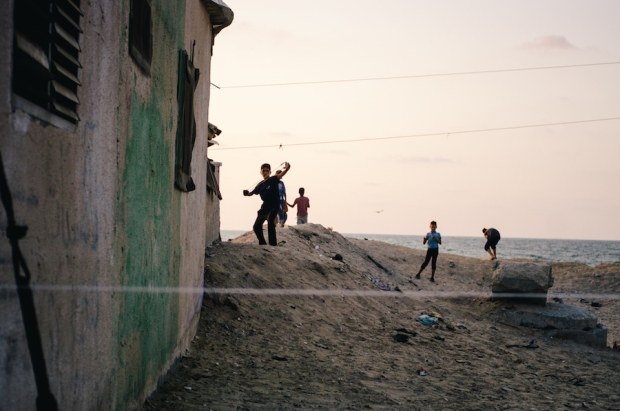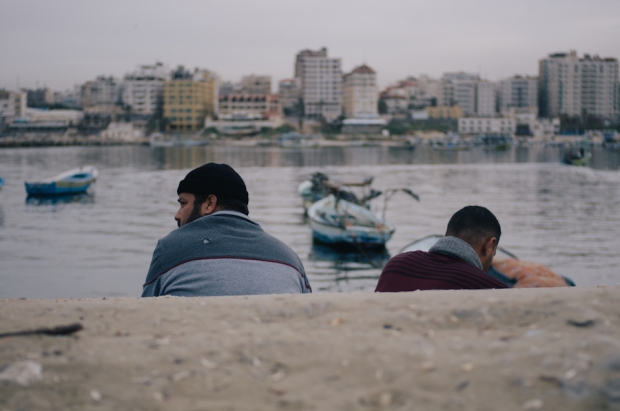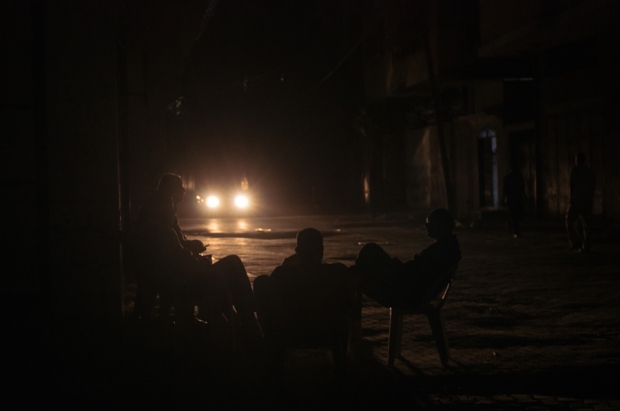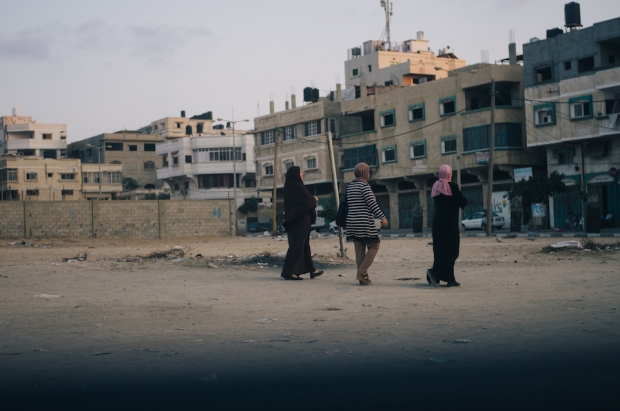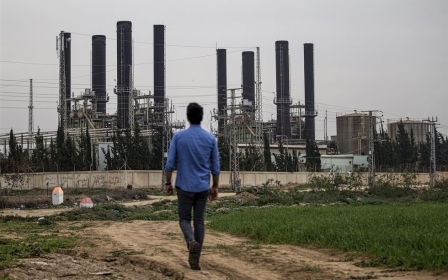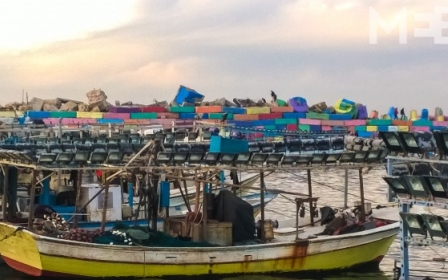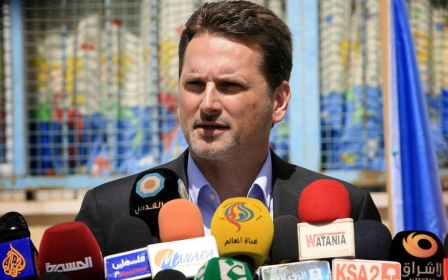'It is a dream': In Gaza, they doubt blockade-busting truce
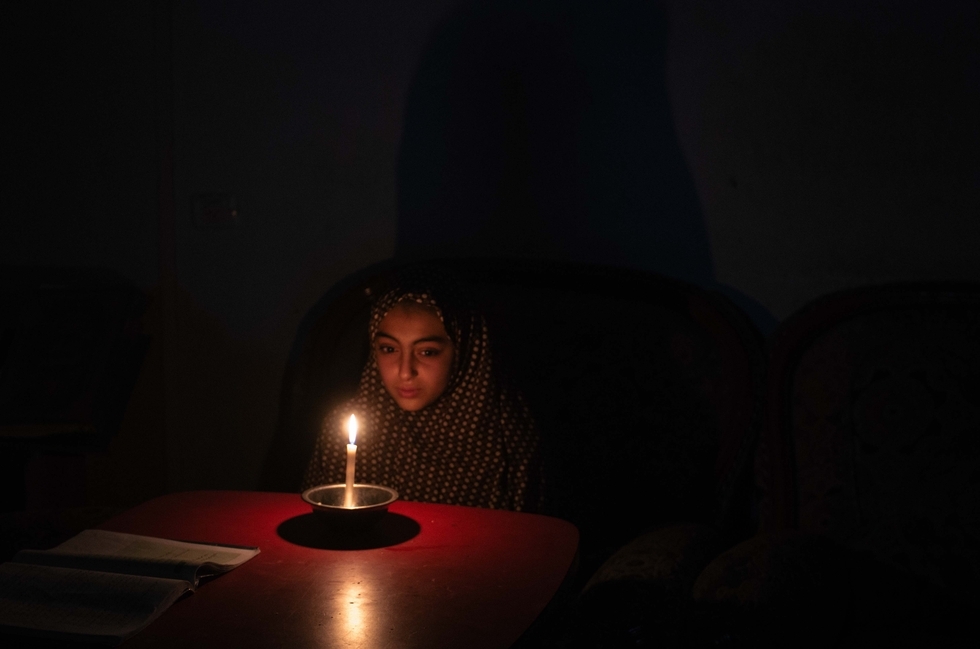
GAZA CITY - Everywhere along Gaza’s coast – at its port, in coastal refugee camps and by beachside stalls hawking coffee and roasted corn – sunset beckons the blockaded enclave’s population to gaze out onto the Mediterranean.
The sea has provided a mental release for Gaza’s two million people during a decade of war and blockade that has destroyed homes, ravaged the economy and strangled daily life - but ongoing ceasefire talks could provide a more tangible escape.
A sea passage to Cyprus that would finally free Gaza’s captive residents to move beyond its boundaries has been a crucial condition in momentous but fragile negotiations between Israel and Hamas.
Hamas officials told Middle East Eye the route would “lift the blockade".
To prevent either of those outcomes under their watch, Qassem said Hamas has shown just how ready the movement is for a peace deal by controlling the intensity of weekly protests on the frontier with Israel and reducing the number of incendiary kites and balloons sent to set fire to Israeli crops.
Israel had been responding to both with lethal force, killing at least 187 protesters with sniper fire and carrying out air strikes on the alleged masterminds of the arson attacks.
Qassem admits the talks - which Hamas’s leader in Gaza, Yahya Sinwar, had previously insisted would soon provide results - have been stalled by the occupied West Bank-based Palestinian Authority, who oppose any deal that does not involve them.
“Things are suspended right now but there is some communication to reach an agreement. The current peace we have is fragile, it could end at any time."
'A dream'
On the Gaza coast, looking out onto the same empty seas that a deal could transform into a hub of activity, expectations are more muted.
They told us 20 years ago that Gaza will be like Singapore. We are waiting
- Hani Thraya, Gaza resident and head of NGO Gaza Aid Association
Palestinians in Gaza have been promised radical changes before. The opening of the border with Egypt was expected as part of sputtering reconciliation talks between Hamas and the PA’s main faction Fatah, revived in October last year, and, immediately before that, in a rumoured deal with the renegade Fatah figure Mohammed Dahlan, whose forces Hamas chased out of Gaza when taking control of it in 2007.
Since then, movement and trade beyond Gaza has been difficult because of an air, land and sea blockade by Israel and Egypt.
"I feel so much pressure here. Every day, I see poor families - that gives me negative feelings. So when I come here, I feel the fresh air. We return home and feel good," said Hani Thraya, who brought a plastic table and chairs to the seaport so his family could watch the sunset as they snacked on beans.
He said he understood negotiations that allowed Palestinians in Gaza “to breathe” by relaxing some of the blockade's restrictions, though he felt they should be negotiated jointly by the Palestinian factions.
But, in reality, he did not expect Israel to honour its promises, even if a truce is agreed.
“It is a dream,” said Thraya, the local head of Turkish-funded NGO Gaza Aid Association. “They told us 20 years ago that Gaza will be like Singapore. We are waiting.”
More failed talks?
The talks were prompted by a military escalation in August that both sides feared could have brought about another war like the violence that killed more 2,200 Palestinians in 2014.
Instead, they began discussing a long-term truce that hinged on Hamas ensuring calm from the Gaza side and Israel loosening the more than decade-long blockade of Gaza imposed when Hamas took control of the enclave.
Aside from a sea port, Hamas are demanding the permanent opening of the border with Egypt and solutions to Gaza's lack of drinking water and electricity, which currently only runs for four hours per day.
“The Palestinian Authority doesn’t want Gaza to have peace...they just want to increase its suffering,” said Qassem, accusing PA President Mahmoud Abbas of wanting to have total control of all political negotiations.
Senior Hamas political bureau figures have doubled down on their messaging about the deal in recent weeks, generally referring to it as a process for “breaking the siege” rather than specifically mentioning negotiations.
Mukhaima Abu Saada, a professor of political science at Gaza's al-Azhar University, who was among a group of analysts and journalists invited to a briefing by Sinwar on the deal in late August, said the Hamas leader was convinced at the time that the deal was close to being finished.
That its prospects were dimming only became apparent around 10 days later, he said, speculating that Abbas may have managed to thwart the deal but threatening to suspend the PA security coordination with Israel in the West Bank.
The Palestinian people are generally pessimistic about what is happening and this is a justified feeling because we as Palestinians cannot make an agreement- Hazem Qasem, head of Hamas’ media unit
Meanwhile both Fatah and Hamas have lost popularity among Palestinians, according to the latest poll from the Palestinian Center for Policy and Survey Research. Released in September, the data reveals a public irritated by a lack of progress in reconciliation talks and “a pointless quarrel” over who has the right to negotiate a truce for Gaza.
The same survey said that while almost two-thirds of people in Gaza supported talks, many Palestinians were concerned that it could lead to a permanent separation between Gaza and the occupied West Bank.
Qassem said Hamas recognises that for Gaza’s residents, the promises offered by negotiations no longer inspire much excitement.
“The Palestinian people are generally pessimistic about what is happening and this is a justified feeling because we as Palestinians cannot make an agreement,” he said, insisting Hamas had not lost hope.
“The Palestinian people have heard tens of times about us going into talks about reconciliation and truce talks. Unfortunately, in all these attempts, we've returned without anything.”
Abu Saada said there was still some hope for the deal, despite the troubles it had run into, because Sinwar appeared committed to ending the blockade.
"My impression was that Sinwar and the leadership of Hamas had taken the decision that the Israeli siege and blockade against Gaza must be lifted in any way," he said, pointing out that in recent weeks Hamas had increased the pressure by calling for more regular protests against Israel.
"It's not an end but definitely there is a serious problem facing a truce agreement between Hamas and Israel."
War and blockade may have dulled the life around the popular Anonymous Soldier park that sits in the centre of Gaza City's commercial district, but they had not previously managed to kill it completely.
New malls built after the 2014 war drew crowds in to polished shops and food courts, competing with some of Gaza's most famous establishments for ice cream and tradition sweets. Families gathered in the park at night for one of the few remaining sources of children's entertainment; a ride in small buggies pushed by Palestinian teens, blasting Arabic pop music and draped in colourful fairy lights.
But more than a year of PA sanctions intended to pressure Hamas into ceding control have taken their toll over the last year, including cuts to electricity and medical supplies and the slashing of salaries paid to its own civil servants to ensure that they did not work for Hamas.
If the number of fishermen before were ten from every 100 people here, now it's two hundred from every hundred
- Salem Abu Riyal, fisherman
The snaking lines outside banks on the days PA salaries are paid are truncated, which means less money is being spent. People still stroll through the centre of the city, peeking through windows, but few carry shopping bags.
At night, informal shared taxis run by private residents from their own cars shuttle down Gaza’s main thoroughfares, but few carry passengers.
A new World Bank report published on Tuesday warned that Gaza’s economy has gone into “free fall”, highlighting that a quarter of families in Gaza are struggling for cash because of the PA salary cuts and Hamas’s inability to pay many of its own employees.
Unemployment rates have continued to reach new heights, reaching 53.7 percent in the second quarter of 2018, according to the Palestinian Bureau of Statists, encouraging many into the informal work.
Salem Abu Riyal, who has 11 children and describes himself as the “godfather of fishing” in Gaza’s Shati refugee camp, said he has seen the industry transformed by the blockade.
Where he once owned a fleet of boats that could go deep into the sea, he now works with a single boat. Finding the fish is a harder task in the overfished three miles that Israel limits them to for most of the year. Finding people to work for him is much easier.
"What do you expect me to find in just three miles?” said Abu Riyal. "Today, if I look for some workers here, I'll find thousands. If the number of fishermen before were ten from every 100 people here, now it's two hundred from every hundred.”
They say the inexperienced fishermen use nets that catch even young fish that should be thrown back, depleting the sea's stocks.
Abu Riyal and others sell their catch on the main road between the homes of Shati camp and the sea but Gaza’s financial problems mean few can afford the crates of crab they have on offer, leaving the fishermen out of pocket.
“When I started fishing, I never suffered from any kind of financial problem until recent years, when the blockade started,” said Abu Riyal. “Now, when my children ask for a single shekel for pocket money, and I can't even afford that.”
This article is available in French on Middle East Eye French edition.
New MEE newsletter: Jerusalem Dispatch
Sign up to get the latest insights and analysis on Israel-Palestine, alongside Turkey Unpacked and other MEE newsletters
Middle East Eye delivers independent and unrivalled coverage and analysis of the Middle East, North Africa and beyond. To learn more about republishing this content and the associated fees, please fill out this form. More about MEE can be found here.


